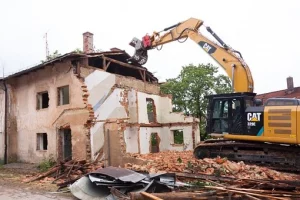A house demolition contract is basically a legal agreement that protects both sides in a demolition cleanup. Before you sign any contract, an attorney should always be consulted. Also it’s advisable to consult your real estate lawyer and your tax consultant. However, they may not always be available to assist you in every scenario.
You can be confident that your interests will not be violated as long your agreement covers the relevant laws. Your home demolition agreement can help protect your interests in a number ways. You can protect yourself from liability. You may be eligible to receive financial compensation if your contractor or subcontractor is held responsible for any damages, injuries or death that result from the work being done. If you own property and have no insurance to cover demolition costs, your home demolition contract will protect your interests.
If you are being forced to move from your property, the house demolition agreement will protect your interests. For instance, if there are large-scale renovation projects going on in your neighborhood, and they are demolishing a number of houses in your neighborhood, and you don’t have any insurance to cover the cost of the project, then you may be forced to leave your home. Your contractor or subcontractor can be held responsible for any injuries, damages, or death caused during the house demolition process. These damages may include those covered in your house demolition contract. Even if your case is not being heard, you may still be protected from future lawsuits, provided that the contractor or subcontractor assumes all responsibility for the damage, regardless whether they were insured.
The terms and conditions of the house demolition agreement will outline what happens if the contractor/subcontractor is unable to complete the project within the agreed timeframe or if there are issues with materials or labor. If there are delays or other setbacks to the project, the house demolition contract will detail what is required, when, and how. It’s important that a house demolition agreement be drafted in conjunction with the contract for the commercial property, so that both parties are completely clear on what the obligations are in the event of a failure to meet a deadline. In many cases, the landowner that is renting his property will insist on being included in the house demolition agreement drafting process. However, it’s often best if the contract for the commercial property is drafted separately, as the landowner can more easily negotiate terms pertaining to his property.
Important to note that even if the house demolition process is delayed or aborted, a house demolition contract should still be prepared. This will avoid any confusion about what must be done. If the property owner has a pre-approved Special Purchase Offer (SPO), it is important that the contract matches the time frame for the purchase. This will prevent any disputes later on over who was responsible to pay for the expenses associated the purchase of the home.

The typical house demolition agreement will also state that any belongings left inside the property after the demolition will be compensated for. Again, it’s advisable to draft this section of the contract very carefully. To protect against any loss or damage, it is important to include all family photos, artwork, and other items. In the worst case scenario, the property owner may decide to demolish the property in order to retrieve all of the items left in the home. If the property is beyond repair or the belongings are of no monetary value the owner may have to sell it.
It is important that this section of your house demolition agreement clearly outlines when the property owner will be allowed to enter the structure once demolition has been completed. If the demolition takes longer than expected, the property owner should not be required to allow inspections or check-ins. The property owner should be allowed to enter and leave the house as needed, provided there is no issue with the home’s general functioning. Any potential risk should always be discussed and fully understood. It’s also a good idea mention any insurance policies that may be in effect in the case of any damage to or loss to the property.
A house demolition agreement should include the following key elements: the address and name of the property owner, the detailed schedule of all expenses, clear guidelines for the removal of belongings and instructions on how the property will rebuild after the demolition. Before the demolition can begin, it is important to have the premises inspected by licensed professionals in the event of damage. The contract should also detail how the project’s costs will be reimbursed. A house property certificate should be attached to the legal contract. This will ensure that no property rights remain in dispute. This will keep everyone together and reduce future disagreements about what happened and who is responsible.
